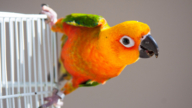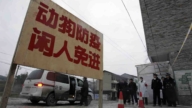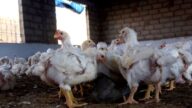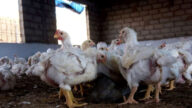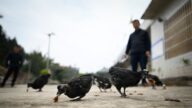【新唐人2013年04月19日訊】奪命H7N9型禽流感已經在中國大陸從長三角擴散到了北方,對中國畜禽業可以說是帶來了[滅頂之災]。由於疫情的擴散,各地的禽類價格大幅下滑,市場極度清冷,有些地方的養殖戶對積壓的家禽進行了銷毀。17號,中國畜牧業協會估算,整個禽類養殖業的損失超過170億元,而且危及到了中國畜禽業和相關企業的資金鍊。
4月18號,上海市通報表示,本市新增了1例人感染H7N9禽流感病例。截至下午5點,中共媒體共曝光了84例已確診的人感染H7N9禽流感病例。
16號晚,中共農業部發佈的最新檢測信息說,江蘇和浙江動物疫病預防控制中心,從送檢的禽類樣品中檢出5份H7N9禽流感陽性,分別來自雞和鴿子。這個消息導致大陸民眾談[雞]色變,不敢再吃禽類。
而隨著H7N9禽流感病例和所涉省份的陸續增加,禽流感已經危及到了中國畜禽業和相關企業的資金鍊,同時,對經濟社會各方面的影響也愈加明顯,餐飲、旅遊、航空、物流都受到波及。
中國畜牧業協會對家禽業龍頭企業進行調查和測算,截至17號下午,禽類中僅肉雞、雞苗、活雞及雞肉產品損失已超過167億元。如果算上鴨類產品及肉鴿養殖等,整個禽類養殖業的損失超過170億元。
四川德陽廣漢市向陽鎮養鴨個體戶覃先生表示,雖然媒體沒有報導四川有禽流感病例,但是人們對於雞,鴨、鵝,就像躲瘟疫一樣不買了,這段時間他至少損失20多萬。
四川德陽廣漢市向陽鎮養鴨個體戶覃先生:[禽流感針對的就是養殖業這方面,別人雞、鴨、鵝都不敢吃了,你像這個東西,我們做(鴨)苗子的這塊,養殖戶都不養了,我們就受影響了。]
11號,陸媒報導說,H7N9禽流感疫情發生後,福建省漳州市龍海紫泥鎮新洋村一家種鴨廠的老闆林順東的養鴨業深陷泥沼,每天扔掉一萬多隻剛孵化的小鴨苗,這種情況已經持續一週了。
14號,廣東省肇慶貝來得肉鴿基地的養鴿大戶李玉珍對媒體說,這幾天內埋掉12萬隻乳鴿,並開始宰殺一些種鴿﹔肉鴿基地負責人周秀文透露,短短10來天,已經損失200多萬元。
大陸疫情專家趙先生認為,H7N9禽流感的爆發確實是由於禽類市場,動物養殖這些場所管理不規範所滋生的。但是,當局平常管理不善,出現問題馬上就走到另一個極端,像這種對雞、鴨、鴿的絕殺方式,是否合理,值得大家思考。
大陸疫情專家趙先生:「你殺了雞以後,補償辦法是甚麼?現在沒看到它補償辦法是甚麼,是不是你把人家(禽類)殺了,畜牧飼養主就該倒閉了?該家破人亡了?這個是不是會對社會財富造成影響?就是你政府賠償,也是把社會財富賠償進去了。」
趙先生指出,絕殺,不是長效之治,病毒的照樣會再次傳播,老百姓同樣存在著風險。對於防治禽流感,當局是不是用最高的效率,最低的代價,最小的損失來解決問題才是值得大家關注的。
此外,近日,長春《好生活》網站、認證為長春雅寧口腔門診部創辦人的微博會員「雅喜愛行動派」都在網絡上爆料,在長春醫大二院發現一例H7N9疑似病例患者,病患被隔離,還有網絡上多次爆出天津、遼寧、長春等省市也出現了疫情及死亡病例,但都沒有見到媒體的通報。
民眾擔心,再次出現遲報、瞞報、漏報疫情的現象,更擔心當局像10年前的非典一樣,活著焚燒病患者,宣稱「戰勝」了瘟疫。
採訪編輯/李韻 後製/李智遠
H7N9 avian virus spread and poultry destroyed
The deadly H7N9 bird flu has spread from the Yangtze River
Delta to northern Mainland China.
It is disastrous to China’s livestock and poultry industry.
Due to the spread of the epidemic, poultry prices
have fallen sharply.
Some places, farmers have to destroy the poultry because
there is no place to keep them.
On April 17th, the China Animal Husbandry Association
estimated the entire poultry industry loss equals more than 17 billion yuan.
It also endangers the capital chain of businesses related
to livestock industry.
On April 18th, Shanghai Bulletin announced another case
of H7N9 avian influenza in the city.
At 5pm, the CCP media disclosed a total of 84 cases
of confirmed H7N9 avian bird flu.
On the night of April 16th, the Department of Agriculture
released the latest detection information from Jiangsu
and Zhejiang animal disease prevention and control center
that five chicken and pigeon samples tested positive for H7N9.
This information has instilled fear in people and they
are afraid to eat poultry.
With the H7N9 avian influenza continuing to spread to more
provinces, it has seriously affected China’s livestock industry and related businesses.
It further threatens the economic and social aspects,
including catering, tourism, aviation, and many other areas.
On April 17th, China Animal Husbandry Association
estimated the loss of day-old chicks, live chickens and chicken products at more than 16.7 billion yuan.
If duck products and pigeon meat are included,
the financial loss has exceeded 17 billion yuan.
Mr. Qin from Guanghan City, Sichuan said that although
Sichuan has not reported cases of bird flu, people
have avoided buying them.
He has lost at least 200,000 yuan in a short period.
Mr. Qin: “Avian influenza is bad for the aquaculture industry.
When people do not eat chickens, ducks, and geese,
farmers do not raise ducks, we can’t sell seedlings/ducklings.
So, we are affected.
On April 11th, Mainland media reported that after the H7N9
avian influenza outbreak, an owner of the duck industry
in Fujian has thrown away more than 10,000
hatched ducklings daily.
This has lasted more than a week.
On April 14th, Li Yuzhen, owner of a large pigeon farm
in Guangdong, told the media that she has buried
more than 120,000 baby pigeons and started to slaughter
some breeding pigeons.
Within 10 days, her loss has been more than
two million yuan.
Mainland epidemic expert Mr. Zhao believes that
the outbreak of the H7N9 bird flu is due to the irregularities in the poultry industry.
However, poor management leads to problems.
Once troubles come, authorities normally go extremes,
such as destroying chickens, ducks, and pigeons.
Is this reasonable?
It is worthy of pondering.
Mr. Zhao: “After you kill the chickens, how much
will you be compensated?
I have not heard of any compensation yet.
After the livestock is destroyed, the owners of these farms
are ruined financially.
This method of dealing with the problem impacts
social wealth.
Compensation should come from the government.
That means the government will compensate
for the social wealth.
Mr. Zhao points out that destroying the livestock
is not a long-term cure.
The virus will spread again, and the people
are also at risk.
For the prevention and control of avian influenza,
we need to pay attention to what offers the highest
efficiency, lowest cost, and minimal loss, in order
to solve the problem.
Recently, the “Good Life" website in Changchun disclosed
that there was a patient with questionable H7N9 bird flu.
The patient was isolated.
Many websites on the Internet reported cases of H7N9
from Tianjin, Liaoning, Changchun and other provinces and cities.
However, Mainland media did not report these cases.
The public is p worried about a repeat of the scenarios of late,
concealing, omitting reports of the epidemic.
They worry even more that authorities may incinerate
patients alive and claim triumphing over the virus, as they did to SARS patients 10 years ago.


